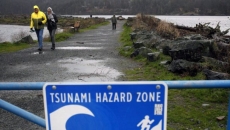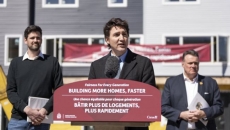India's envoy to Canada is scheduled to speak publicly today for the first time since the RCMP made arrests in a killing that has roiled tensions between the two countries.
High Commissioner Sanjay Kumar Verma is to address the Montreal Council on Foreign Relations on the theme of current and future relations between India and Canada.
His speech was first announced in April, months into a diplomatic spat over the death of Hardeep Singh Nijjar.
Nijjar had long advocated for a Sikh country called Khalistan to be carved out of India, and he was shot dead last June outside his temple in Surrey, B.C.
Prime Minister Justin Trudeau accused New Delhi last September of playing a role in the killing, and the RCMP arrested three Indian nationals last Friday.
Foreign Affairs Minister Mélanie Joly says her government will let the Mounties investigate instead of commenting on the case.
"We stand by the allegations that a Canadian was killed on Canadian soil by Indian agents," she said on Parliament Hill, adding that she still wants to conduct diplomacy with India in private.
"The investigation by the RCMP is being done; I won’t further comment and no other officials from our government will further comment."
Over the weekend, Indian Foreign Affairs Minister Subrahmanyam Jaishankar reacted to the arrest by accusing Canada of welcoming in criminals from his country.
Vina Nadjibulla, the research vice-president for the Asia Pacific Foundation of Canada, says that despite the tensions, India remains a strong trade partner — one with increasing strategic importance for many of Canada's peers.
"Canada at the moment is an outlier, when it comes to that kind of strategic deepening of partnership with India," she said.
The strain dates back to Nijjar's death, which sparked a wave of protests. Posters circulated that threatened Indian diplomats in Canada by name.
Ottawa paused trade negotiations with India last August, a month before Trudeau publicly linked New Delhi to the case.
In response to Trudeau's accusation, India forced Canada to remove two-thirds of its diplomats from the country, threatening to strip them of diplomatic immunity.
New Delhi also temporarily suspended visas for Canadian visitors.
For months, Ottawa has demanded that New Delhi co-operate with the murder probe. Up until last week's arrests, Verma had repeatedly said Canada must provide evidence.
India is currently undergoing a months-long national election, during which Nadjibulla said rhetoric from the government of Indian Prime Minister Narendra Modi will be increasingly at odds with Canada.
In his comments last week, Jaishankar lamented that "our biggest problem right now is in Canada," referring to Sikh separatism.
India deems it unconstitutional to call for separation from India, but Canada says Sikh people in Canada are entitled to free speech if they're not inciting violence.
Last month, Modi twice made statements in Hindi about his country's ability to kill those abroad who challenge the country's territorial integrity, in comments that were more broadly related to Pakistan.
Despite the rift, there are no signs Canada's trade with India has declined, and provinces in particular have been seeking stronger ties.
Alberta Premier Danielle Smith welcomed Verma in March.
Saskatchewan Premier Scott Moe met Jaishankar last February and spoke at the Raisina Dialogue, a major foreign-policy conference in India.
Last week, the province announced it had convinced New Delhi to reinstate the province's envoy, who Saskatchewan said was among the Canadian officials India forced to leave.
Nadjibulla attended the same conference as Moe in February. She observed that India displayed "tremendous confidence" over its rising economic power, population and regional clout.
The country has ambitions to be a global power through a foreign policy based on strategic autonomy, she said, meaning that it is open to working with Europe, Russia and China without being left to rely on any of them.
"There are many partners and suitors at the moment showing up in New Delhi," she said.
She contrasted that to China, with which Canada maintains significant trade ties but is increasingly at odds over security, global trade rules and regional defence.
Nadjibulla argued Canada should consider reopening trade talks with India, despite the ongoing homicide case.
"There's a lot we can be doing together, and that the momentum was there before the diplomatic crisis," she said.
"We do need to stabilize and improve that relationship, because that is in Canada's national interest."






